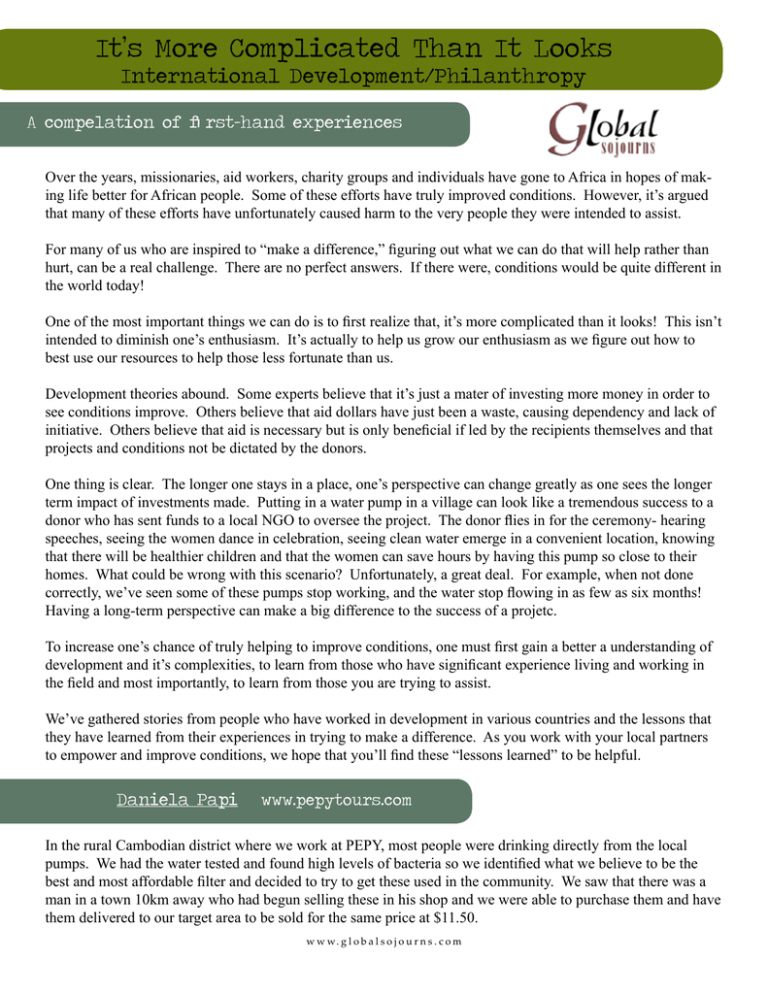It`s More Complicated Than It Looks
advertisement

It’s More Complicated Than It Looks International Development/Philanthropy A compelation of first-hand experiences Over the years, missionaries, aid workers, charity groups and individuals have gone to Africa in hopes of making life better for African people. Some of these efforts have truly improved conditions. However, it’s argued that many of these efforts have unfortunately caused harm to the very people they were intended to assist. For many of us who are inspired to “make a difference,” figuring out what we can do that will help rather than hurt, can be a real challenge. There are no perfect answers. If there were, conditions would be quite different in the world today! One of the most important things we can do is to first realize that, it’s more complicated than it looks! This isn’t intended to diminish one’s enthusiasm. It’s actually to help us grow our enthusiasm as we figure out how to best use our resources to help those less fortunate than us. Development theories abound. Some experts believe that it’s just a mater of investing more money in order to see conditions improve. Others believe that aid dollars have just been a waste, causing dependency and lack of initiative. Others believe that aid is necessary but is only beneficial if led by the recipients themselves and that projects and conditions not be dictated by the donors. One thing is clear. The longer one stays in a place, one’s perspective can change greatly as one sees the longer term impact of investments made. Putting in a water pump in a village can look like a tremendous success to a donor who has sent funds to a local NGO to oversee the project. The donor flies in for the ceremony- hearing speeches, seeing the women dance in celebration, seeing clean water emerge in a convenient location, knowing that there will be healthier children and that the women can save hours by having this pump so close to their homes. What could be wrong with this scenario? Unfortunately, a great deal. For example, when not done correctly, we’ve seen some of these pumps stop working, and the water stop flowing in as few as six months! Having a long-term perspective can make a big difference to the success of a projetc. To increase one’s chance of truly helping to improve conditions, one must first gain a better a understanding of development and it’s complexities, to learn from those who have significant experience living and working in the field and most importantly, to learn from those you are trying to assist. We’ve gathered stories from people who have worked in development in various countries and the lessons that they have learned from their experiences in trying to make a difference. As you work with your local partners to empower and improve conditions, we hope that you’ll find these “lessons learned” to be helpful. Daniela Papi www.pepytours.com In the rural Cambodian district where we work at PEPY, most people were drinking directly from the local pumps. We had the water tested and found high levels of bacteria so we identified what we believe to be the best and most affordable filter and decided to try to get these used in the community. We saw that there was a man in a town 10km away who had begun selling these in his shop and we were able to purchase them and have them delivered to our target area to be sold for the same price at $11.50. w w w. g l o b a l s o j o u r n s . c o m We invited someone from the organization where the filters are made to come explain how they work, how they are made, and how best to take care of them. The teachers were given charts with this information and were taught how to then present this information to anyone who was purchasing a filter. The filter program worked well and the teachers were able to get over 150 water filters into local homes. The price for the filter is not insignificant, but the community had seen the results of having clean water as we had been using the filters in the local schools and had drastically increased attendance at school as absences due to sickness went down. We were excited about the benefits these new filters would have on the overall community health. Then a foreign funded group came though, looking to “help the poor people” of the area. They began selling the same filters at $3 each, far below what they had paid for them. In one day, without knowing it, they actually greatly HARMED the potential for health increases in the area. They thought they were “doing good” by giving things away, or subsidizing them, but instead, without knowing much about the area, they: • damaged the market potential for both our teacher’s filter sales program and the nearby shop owner • built mistrust as the community now thought the filters really should have been much cheaper or that they should hold off on buying them as someone might come give them one • did not do the training/education necessary to actually help people understand how/why they work - so people are not taking care of them, thereby undermining the power of the very filters they distributed • created a situation where the richer (all relative of course) people no longer want that product. It is now viewed as “cheap” - subsidized to the poor people, so it must not be good, in their minds. Those who can afford it have now been saving up for the nearly $20 filters being marketed by Korean groups which are much more high tech looking but actually do not remove bacteria from the water, but with a higher price tag, no education coming with the product, and community trust damaged, some are using their very limited budgets to buy a product which is often essentially one month’s worth of income and not effective. In this case, “giving things away” took away the very thing they were trying to provide: a chance to have clean water. Priscilla Macy www.globalsojourns.com This first story comes from my experience of living in Cuamba, Mozambique for 3 years. At that time, Mozambique was the poorest country in the world and we lived in the “forgotten province” where people were just trying to survive on subsistence farming. I was conducting cultural anthropological studies on women’s lives. This is a very simple story and yet it spoke volumes to me regarding assumptions that I had made. I was interviewing a woman outside her one room mud home and we were chatting about her crops. She said that she had a good harvest. I responded saying, “That’s wonderful. You must be very happy!” Instead of getting any sign of joy from her, she looked quite stressed as she said, “No! The neighbor’s crop did not do well this year. They are going to be jealous of me and this will cause trouble. Maybe they will even have a spell put on me.” w w w. g l o b a l s o j o u r n s . c o m This next story comes from a visit I made to an orphanage just north of Johannesburg in South Africa: I was visiting with the manager of an orphanage when a visitor (travel agent from New Zealand) full of enthusiasm, ran up to say good-by. This visitor had come with a friend to see if this would be a good place to send some of their clients during their travels to do some short-term volunteer work. The gal and her friend had spent the day at the orphanage, working hard with the younger children- helping to bathe and feed them. That same day, there were two flight attendants from an airline that provides funding to the orphanage. When flight attendants from the airline have a free day in Johannesburg, they often drive up to spend a day or afternoon playing with the kids. The two flight attendants had been outside playing with the older kids and it looked like everyone was having a grand time. In her good-bye to the manager, the agent from New Zealand said that she was already “recruiting” for the orphanage and had gotten an enthusiastic response from the flight attendants that they would definitely come back to play with the kids. After she left, I could tell that the manager was quite uncomfortable. I asked her what was wrong and after awhile, she opened up. “It’s not good for the children to have these people coming and going. They get confused and wonder why these people don’t come back. What’s most important is that the children develop strong, consistent bonds with the caretakers who work here. We are happy to have volunteers come to help us with the building projects such as repairing the fence but we don’t feel it is good for the children to have all these people coming and going.” I’ve heard this type of comment from a number of people running/working at orphanages. Long-term volunteers are generally quite welcome and when there are babies, having short-term visitors come to hold them can be positive. But more often than not, the feeling is that having multiple visitors can be disruptive and have a negative impact on the children. Just one of those examples of how things can look one way on the surface and be quite different when you get to understand the situation better. McOwiti O. Thomas Native Kenyan During the mid to late 1990s, some well meaning organizations started distributing insecticide treated mosquito nets as part of a project to study the efficacy of the treatment. The nets were issued to randomly selected, mostly poor families in several districts, including the area around my home. My family was among the lucky ones, and on one visit home I found one of the nets hanging over my bed. Considering that I only visited home once or twice a year and I could afford to buy one for myself I asked if I could give it to someone else who needed it more-- My father insisted absolutely not. My father explained that they were under strict instructions not to remove the nets at whatever cost, even if nobody was using them. I later learned that the researchers didn’t think the locals would understand what they were doing (i.e., the true purpose of the nets)--in other words, they feared that some people would sell their nets thereby exposing themselves and their children to malaria and defeating the purpose of the study, so the only remedy was to tell everyone that the nets were meant to stay put until they were told otherwise. The researchers also were afraid that they would bias the study if they revealed its true intent, so they left people in the dark. The end result was the complete opposite of what they had intended: In the absence of reliable information, it wasn’t long before rumors started flying around that the nets were cursed and would kill whoever slept under w w w. g l o b a l s o j o u r n s . c o m them (apparently, some child had died after having slept under one). Some people swore that the nets caused them to feel as if they were suffocating whenever they slept under them. It turned out that some of the people who had missed out on the nets started the rumors, not with the intention of sabotaging the study (which they didn’t know about), but out of jealousy. They simply wanted to scare their relatives and friends into getting rid of the nets so that everybody was equal. I don’t know what results the study eventually reported, but they couldn’t have been pretty or very reliable/accurate [my feeling]. So, although the researchers meant well, their lack of understanding the local culture (i.e., we should all strive to be equal) probably doomed their study. But that was not all: after the study ran its course, those who had the nets sold them off to others, often at a fraction of their true cost. By now the more enlightened folks (who had access to news sources and reliable information) had learned the true purpose and benefit of the nets. But their poorer brethren, who had been kept in the dark and who fell for the rumors, were only too glad to get rid of them at what they thought was a neat “profit” because they hadn’t paid for them in the first place, rather than burn them as some were doing. The whole purpose of the study and the potential benefit of the project was lost even further. So, the researcher made two critical mistakes that doomed their study/project: 1) they did not trust the people to understand their objectives and failed to come clean about the true nature and purpose of their study, and 2) they did not take into account the local culture. Peter Macy International Water Engineer Time Concepts In preparing for one project, I was to go to villages that had the potential of being selected to receive funding for a new school. So, for one potential village, I drove out at the appointed time, 10 AM and arrived to find no villagers to talk to. I waited 15 minutes, 30 minutes and then 1 hr before leaving – having seen no one the entire time I was there. This was curious as I knew they wanted a school and were quite energetic. Why didn’t anyone show up? This was repeated a second time on a separate day to the same village. When I came back from my 2nd frustrating visit I asked a local school teacher why this was happening. He smiled, stuck his arm out and swept it from the horizontal position until it was pointed at the sun. He said, the villagers had a different concept of time and 10 AM meant little to most of them. They thought I meant “meet at approximately this time, approximately when the sun was at such a location in the sky”. So I went the 3rd time, with only an approximate morning time frame (I think I actually came late) and found the villagers and village elders ready to talk about their new school. Lesson learned – different cultures have vastly different attitudes about time. Operations and Maintenance In the early days of my career in development I would talk to my local partners about operations and maintenance. In my mind, I was thinking about oiling parts, replacing worn washers, exercising valves, checking on the condition of moving parts, etc. During these discussions, my partners would nod their head in agreement and say, in essence, ‘yes, we understand O&M, we do it all the time, and will continue to do it’. But, time and time again, maintenance was never done. I’m sure I wasn’t being lied to, so what was going on? Apparently, every time the word “maintenance” left my mouth, the word “repair” (because something completely broke) entered their ears! Yes, the concept of maintenance, when nothing had completely broken, was a completely foreign concept. And, my partners would be thinking ‘why invest any time and money doing something [maintenance] when nothing had broken yet?’ They preferred, and had a history of only working on systems after they had completely failed. To assist them with understanding the need for maintenance was a significant and recurring effort. w w w. g l o b a l s o j o u r n s . c o m



